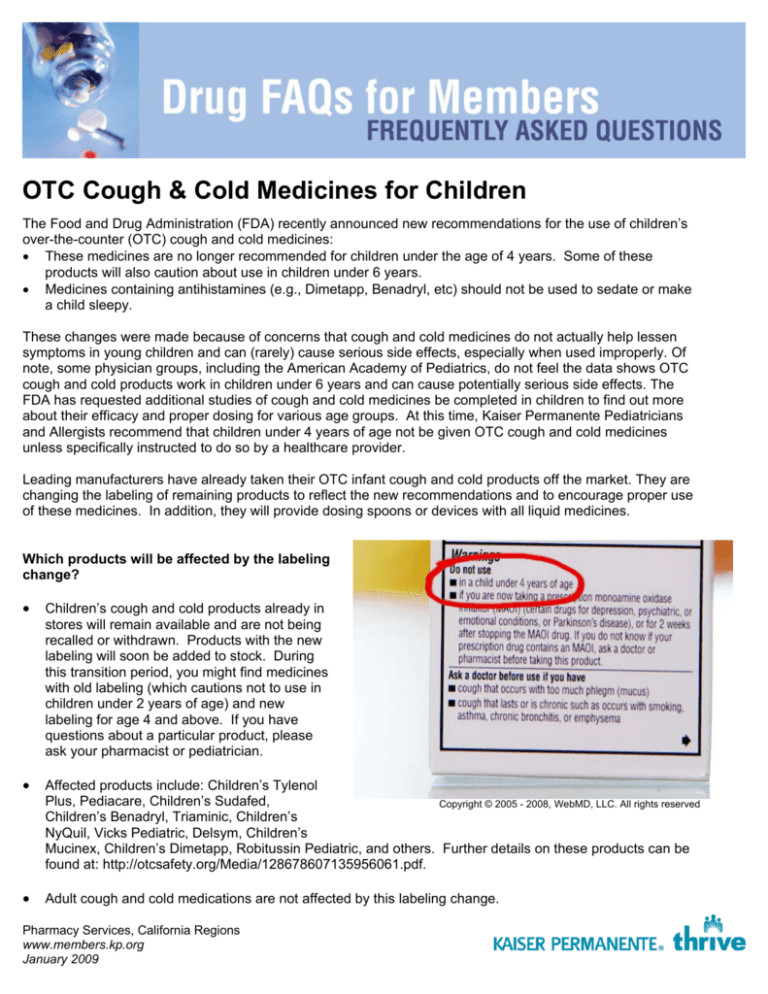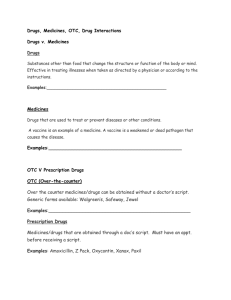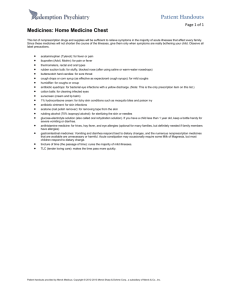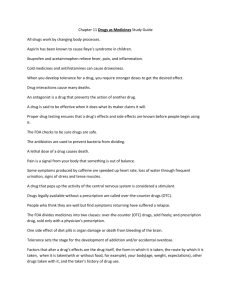
OTC Cough & Cold Medicines for Children
The Food and Drug Administration (FDA) recently announced new recommendations for the use of children’s
over-the-counter (OTC) cough and cold medicines:
• These medicines are no longer recommended for children under the age of 4 years. Some of these
products will also caution about use in children under 6 years.
• Medicines containing antihistamines (e.g., Dimetapp, Benadryl, etc) should not be used to sedate or make
a child sleepy.
These changes were made because of concerns that cough and cold medicines do not actually help lessen
symptoms in young children and can (rarely) cause serious side effects, especially when used improperly. Of
note, some physician groups, including the American Academy of Pediatrics, do not feel the data shows OTC
cough and cold products work in children under 6 years and can cause potentially serious side effects. The
FDA has requested additional studies of cough and cold medicines be completed in children to find out more
about their efficacy and proper dosing for various age groups. At this time, Kaiser Permanente Pediatricians
and Allergists recommend that children under 4 years of age not be given OTC cough and cold medicines
unless specifically instructed to do so by a healthcare provider.
Leading manufacturers have already taken their OTC infant cough and cold products off the market. They are
changing the labeling of remaining products to reflect the new recommendations and to encourage proper use
of these medicines. In addition, they will provide dosing spoons or devices with all liquid medicines.
Which products will be affected by the labeling
change?
•
Children’s cough and cold products already in
stores will remain available and are not being
recalled or withdrawn. Products with the new
labeling will soon be added to stock. During
this transition period, you might find medicines
with old labeling (which cautions not to use in
children under 2 years of age) and new
labeling for age 4 and above. If you have
questions about a particular product, please
ask your pharmacist or pediatrician.
•
Affected products include: Children’s Tylenol
Plus, Pediacare, Children’s Sudafed,
Copyright © 2005 - 2008, WebMD, LLC. All rights reserved
Children’s Benadryl, Triaminic, Children’s
NyQuil, Vicks Pediatric, Delsym, Children’s
Mucinex, Children’s Dimetapp, Robitussin Pediatric, and others. Further details on these products can be
found at: http://otcsafety.org/Media/128678607135956061.pdf.
•
Adult cough and cold medications are not affected by this labeling change.
Pharmacy Services, California Regions
www.members.kp.org
January 2009
Tips for managing cough and cold symptoms in children under 4 years of age:
•
•
•
•
Make sure that your child gets plenty of rest and fluids.
Remember that colds last about a week, but some symptoms like cough can last longer, e.g., up to several weeks.
Understand that using OTC cough and cold medicines will not cure a cold or cough.
Use a rubber suction bulb to gently clean an infant’s clogged nose.
− Saline nose drops can be used to soften the mucus.
• Because colds are caused by viruses, antibiotics have no effect on the symptoms of the infection. Many
Pediatricians, however, recommend use of a humidifier to relieve the symptoms of nasal congestion caused by the
cold viruses and acetaminophen (any age) or ibuprofen (if over 6 months of age) to alleviate pain, fever or body
aches. Check that these medications do not contain extra ingredients.
Parents can also find information in the Kaiser Permanente Healthwise Handbook online at the Kaiser
Permanente website (http://www.kp.org).
General tips to consider before giving your child OTC medicines:
Choose medicines wisely
• Choose a product suitable for your child’s age. Do not give your child a medication that is intended for adult
use only.
• Check the “active ingredients” section of the Drug Facts label of the medications that you plan to use.
• Only give the medicine that targets the symptoms that your child is having.
• Low-sedating antihistamines (e.g., Claritin) are generally preferred over sedating antihistamines (e.g.,
Benadryl) for the treatment of allergic rhinitis.
Give medicines properly
• Always read and follow the dosing directions on the Drug Facts label of any OTC medication.
• Only use measuring spoons or cups that come with the medicine or those made especially for measuring
drugs.
• Never give your child two medicines at the same time that contain the same active ingredient.
• If your child develops side effects to the medication that concern you, stop giving the OTC medicine and
immediately contact a physician.
• Never use an OTC medicine to sedate or make your child sleepy.
• Never give products containing aspirin to a child to treat cold or flu symptoms unless instructed by a
physician.
Keep medicines safely
• Choose OTC cough and cold medicines that have child resistant safety caps, when available.
• Keep all medications out of the reach and sight of your child.
For more information
• If you have any questions about cough and cold products, talk to a healthcare professional.
• For more safety tips for OTC medicines, see the OTCsafety.org website:
http://www.otcsafety.org/Parents/.
Pharmacy Services, California Regions
http://members.kp.org
January 2009





